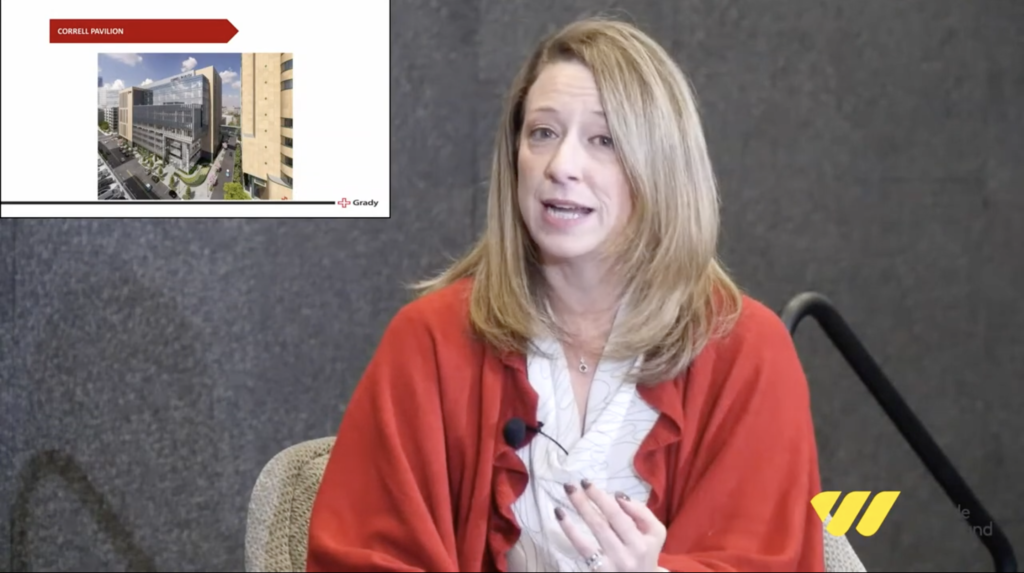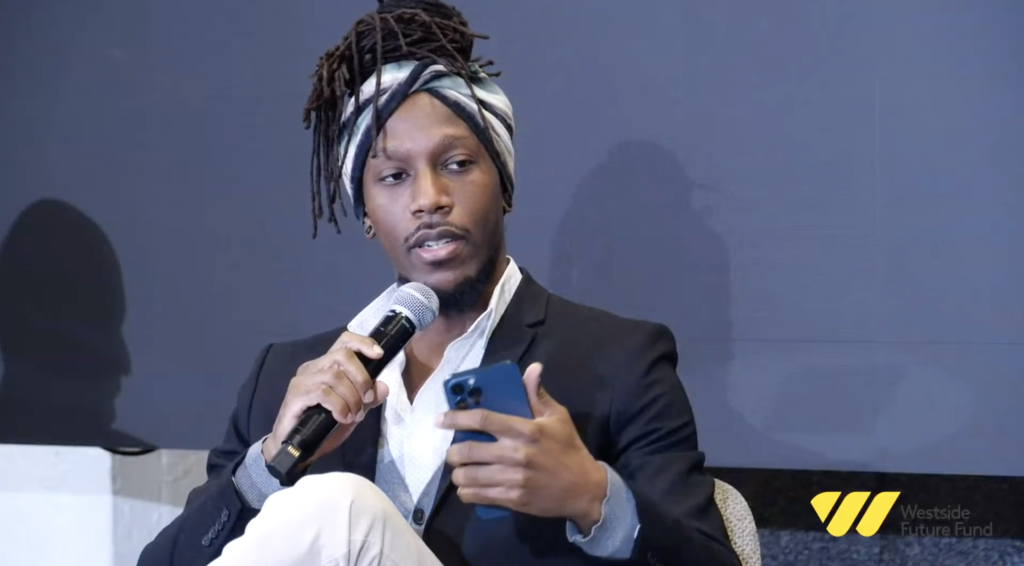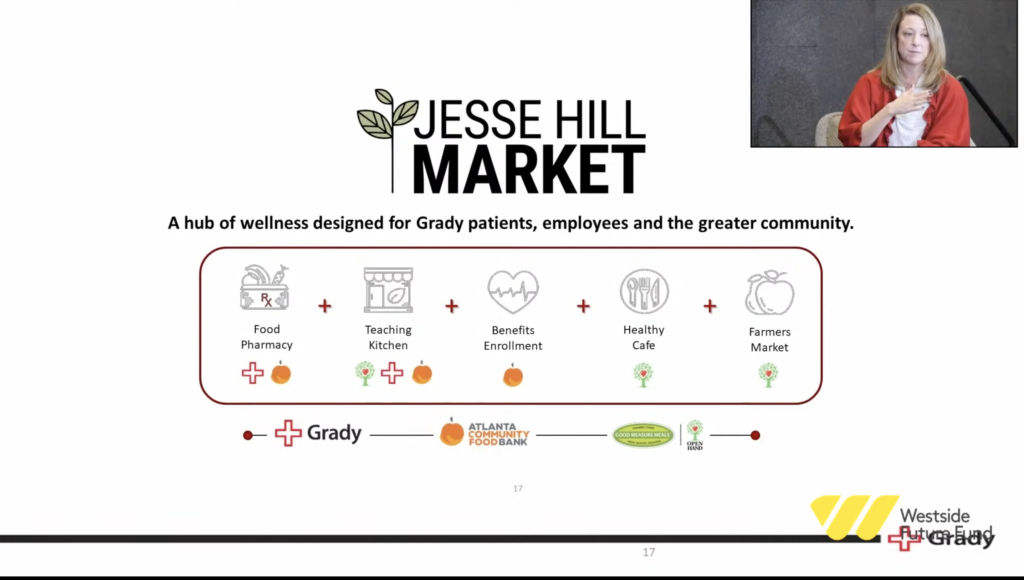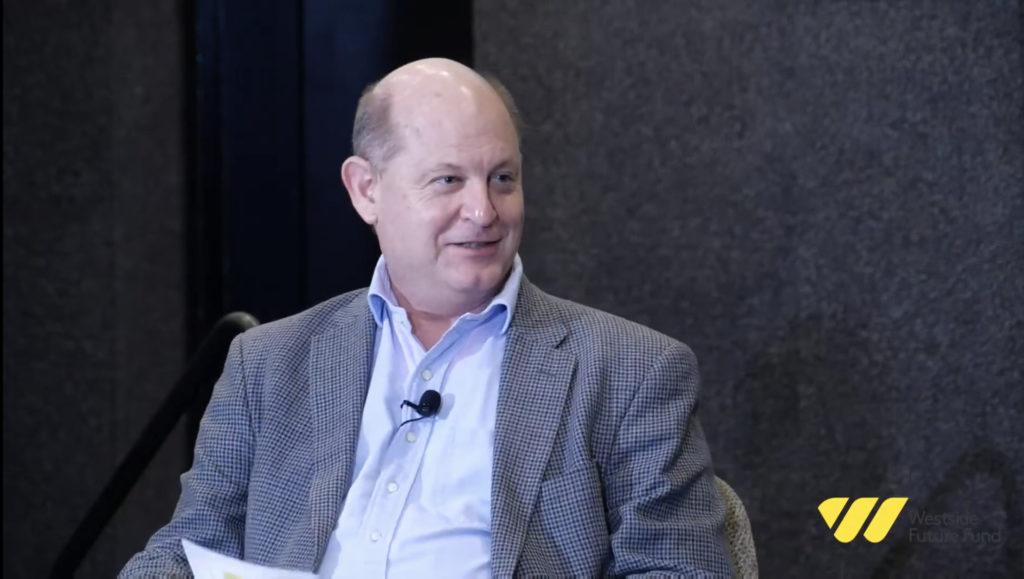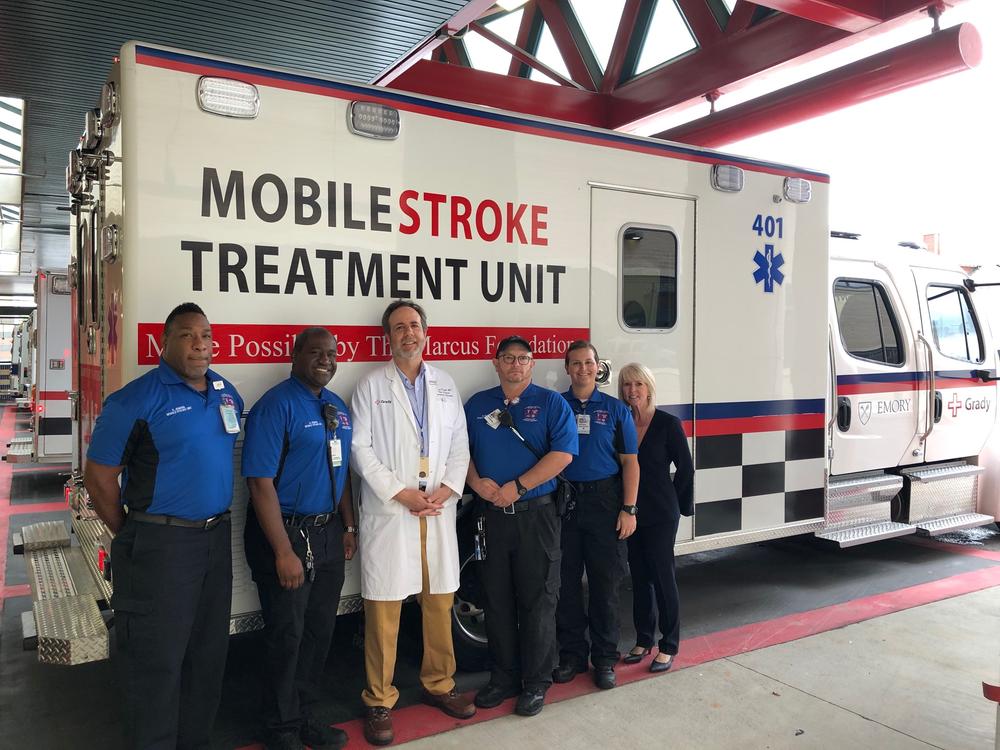February 4th Virtual Transform Westside Summit: Highlighting Grady Health System’s Holistic Investment via Health Initiatives to Support Westside Residents
Westside Future Fund’s February 4th Virtual Transform Westside Summit highlighted Grady Health System‘s latest innovations and efforts to enhance the health and wellness of Westside residents and of greater Atlanta. John Ahmann, WFF’s President & CEO, along with WFF Co-hosts Benjamin Earley and Ebony Ford, opened the program recognizing Black History Month while broadcasting from The Gathering Spot, located just blocks away from the family home of Coretta Scott King and Dr. Martin Luther King, Jr. The summit’s featured guest was Shannon Sale, Chief Strategy Officer at Grady Health System, who shared Grady’s holistic approach to serving the historic community.
Shannon Sale, Chief Strategy Officer at Grady Health System, gives updates on the added capacity the new Correll Pavilion will offer.
Reach: Touching as many Georgians as possible
Sale: “We are the largest hospital in the state of Georgia and one of the largest safety-nets in the country. We have six neighborhood health centers; over 7,000 employees; we see over 150,000 folks in the emergency department a year and then over 700,000 patient touches…25% of all Georgia physicians have been through Grady at some point and that’s by virtue of our partnerships with Morehouse School of Medicine and Emory School of Medicine.”
Benjamin Earley, WFF Co-host, speaks on equity in healthcare for Black residents.
Covid: Building trust with the Black community regarding vaccinations
Speaking to the history of government sanctioned medical abuse of Black Americans, Earley noted the importance of adequate representation and diversity in clinical trials, including the medical professionals conducting them.
Earley: “I felt more comfortable with the vaccine knowing that there were people of color that were not just on the side of being tested, but also on the side of creating the vaccines in the first place. There were a lot of people, even at Morehouse School of Medicine…a lot of physicians—Black women, Black men—involved in the program to create the vaccine, to make sure that it was an equitable vaccine and that Black people didn’t suffer adverse reactions at a higher rate than anybody else…What’s the easiest way for people who need vaccines to get treated with Grady?”
Sale:
The easiest way to get scheduled for a vaccine is to call 404-616-1000 and get you scheduled at a neighborhood health center…or at Grady Hospital with us today.”
Food as medicine: Grady’s commitment to patient health
Sale: “Grady is not a retail food distributor, but we’re managing a market on site. We moved out McDonald’s, ended their lease, and we were able to turn that space into our Jesse Hill Market. And then in partnership with the Atlanta Community Food Bank—they are on site helping us to distribute fruits and vegetables to patients who have screened insecure for food and who need food to help them with a clinical condition. Open Hand has opened their first retail site as well with a cafe on site, and we have a nutrition teaching kitchen. Patients who have a food prescription are able to get foods for a series of months, up to six months, then they can actually engage again. They receive nutrition classes, they can come in for teaching, and…the Healthy Cafe is a great environment for all of our patients, staff, and community.”
“We’ve also been able to take this off-site to what we call Fresh Food Carts with the Atlanta Community Food Bank. One of the sites is ASA [G. Yancey Health Center] right here on the Westside where we have distributed thousands of pounds of food to the community…It is worth noting that about 14% of the people who are in the food prescription program at the Jesse Hill Market are from the Westside.”
Learn more here.
Behavioral health: an extension of medical care
Sale: “We’ve got a number of innovations in behavioral health including early interventions for psychosis. We have a mobile team as well for behavioral health. When we get a call for behavioral health…versus a medical condition, we can send the right team out to help to de-escalate that and get the patient to the right setting.”
“We have what we call integrated behavioral health. Folks who come to our primary care center can have behavioral health services in that same setting. We’ve expanded that to sickle cell, and cancer, and several of our other specialty areas so that folks don’t have to have that separate visit. Knowing again, for treating the medical condition, that if there’s a behavioral health concern—often depression or other conditions that are keeping folks from their fullest health—that that’s in the same setting.”
Earley: “I want to just say kudos to Grady Health System for helping to make these services more widely available to everybody in the community…speaking from the Black community, I appreciate that. And to anybody out there who feels like you may be suffering from something that is related to mental health, or you know somebody that is, I encourage you to reach out. Whether it’s Grady, some other healthcare system, wherever you can find help, please seek it out because you matter. Your trauma matters. Your struggles matter. Your life matters, and we appreciate you.”
Mobility: Waiting room not needed
John Ahmann, President & CEO, Westside Future Fund talks healthcare equity for Atlanta’s Historic Westside.
Ahmann: “I was thinking about the mobile outreach because what I learned was a great place to do that outreach is at the schools. Back to Black History Month…Atlanta, Georgia is in the southeast, [Booker T. Washington was the] first Black high school opened up in 1924. But that could be a great sight, you know, for your mobile health care clinic…it’s on Whitehouse Drive right off MLK Drive, and across the street is a parking lot. That is where the EMTs sit because the algorithms tell them for 911 calls…they’re there waiting to serve on the Westside. So maybe we can think in the future about how to sponsor some outreach clinics with you all, it would be terrific.”
Sale: “Yes, that’s a great point, too…There’s the health perspective but there’s also the workforce development perspective, and we would love to be able to connect there. We have an academy with EMS where we train our staff up to become an EMT, basic and advanced, and a paramedic. So we have programs to be able to bring people along with that, as well as nursing partnerships. We have our own school of radiology. So I think workforce development is a great place to connect there too.”
Use #WestsideFutureFund to share your Westside stories and engage with us on social media as we work to make the Historic Westside a place that Dr. King would be proud to call home!
View the entire program below.

